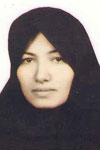 AFP: Iran’s judiciary chief has temporarily halted the execution by stoning of a woman accused of adultery, state news agency IRNA reported on Sunday, quoting a judiciary official.
AFP: Iran’s judiciary chief has temporarily halted the execution by stoning of a woman accused of adultery, state news agency IRNA reported on Sunday, quoting a judiciary official.
By Jay Deshmukh
 TEHRAN (AFP) — Iran’s judiciary chief has temporarily halted the execution by stoning of a woman accused of adultery, state news agency IRNA reported on Sunday, quoting a judiciary official.
TEHRAN (AFP) — Iran’s judiciary chief has temporarily halted the execution by stoning of a woman accused of adultery, state news agency IRNA reported on Sunday, quoting a judiciary official.
But Malek Ajdar Sharifi, head of judiciary of East Azerbaijan province, said the crimes committed by Sakineh Mohammadi-Ashtiani were “heinous” and her execution would take place when the judiciary chief decides.
“Although the verdict is definitive and applicable, the verdict has been halted due to humanitarian reservations and upon the order of the honourable judiciary chief and it will not be carried out for the moment,” Ajdar Sharifi told IRNA.
Mohammadi-Ashtiani, a 43-year-old mother of two, had been sentenced to death by stoning after she was found guilty of adultery by an Iranian court, a ruling that has sparked outcry in Western countries.
Ajdar Sharifi said the stay on the execution was temporary.
“Whenever the judiciary chief (Sadeq Larijani) deems it expedient, the verdict will be carried out regardless of Western media propaganda,” he said.
Mohammadi-Ashtiani was convicted on May 15, 2006 of having an “illicit relationship” with two men, according to her lawyer and London-based rights watchdog Amnesty International.
Amnesty said she received 99 lashes as per her sentence but was subsequently accused of “adultery while being married” in September 2006 during the trial of a man accused of murdering her husband.
Ajdar Sharifi said Mohammadi-Ashtiani had committed several crimes.
“She is not only accused of having illicit relations, but she has also committed a lot of heinous crimes,” he said.
“If we give the details of the crimes she committed, the public will understand the depth of her inhuman and criminal nature. But due to humanitarian considerations we can’t give the details.”
He said her crimes were so severe that “if she had only cut the head of her husband, it would have been better than what she has done.”
On Friday, Iran’s top human rights official Mohammad Javad Larijani had said that Mohammadi-Ashtiani’s death sentence was “under revision” as the chief of judiciary preferred to use another penalty for executions instead of stoning “and that is true for Ms Mohammadi-Ashtiani.”
Larijani did not say what penalty she could face instead, but added: “The penalty of stoning exists under the law but the judges rarely use it.”
The Iranian embassy in London said in a statement reported by The Times on Friday that Mohammadi-Ashtiani would no longer be stoned to death.
The embassy said that “according to information from the relevant judicial authorities in Iran, (Mohammadi-Ashtiani) will not be executed by stoning.”
Explaining the details of her case, her lawyer Mohammad Mostafai told AFP on Saturday that his client knew the man who “killed her husband and because she was at home when the murder took place, she was accused as an accomplice.”
“But after her kids pardoned her in the case of murder, she now stands accused of adultery with that man.”
Under Iranian law if a murder victim’s family, in this case the children of Mohammadi-Ashtiani and her slain husband, forgive the accused, the convict can be either pardoned or given a jail term.
Mostafai added that adultery cases involving women in Iran arise due to difficulties in getting divorces from their husbands despite having “troubled marriages.”
The stoning sentence has sparked an outcry in Western countries with US State Department spokesman Mark Toner calling it a “barbaric and abhorrent act.”
British Foreign Secretary William Hague said in London that if the “mediaeval” execution went ahead it would “disgust and appall” the world.
An open letter condemning the execution was also signed by figures such as former US secretary of state Condoleezza Rice, three ex-British foreign ministers, Nobel peace laureate Jose Ramos-Horta and actor Robert De Niro.


